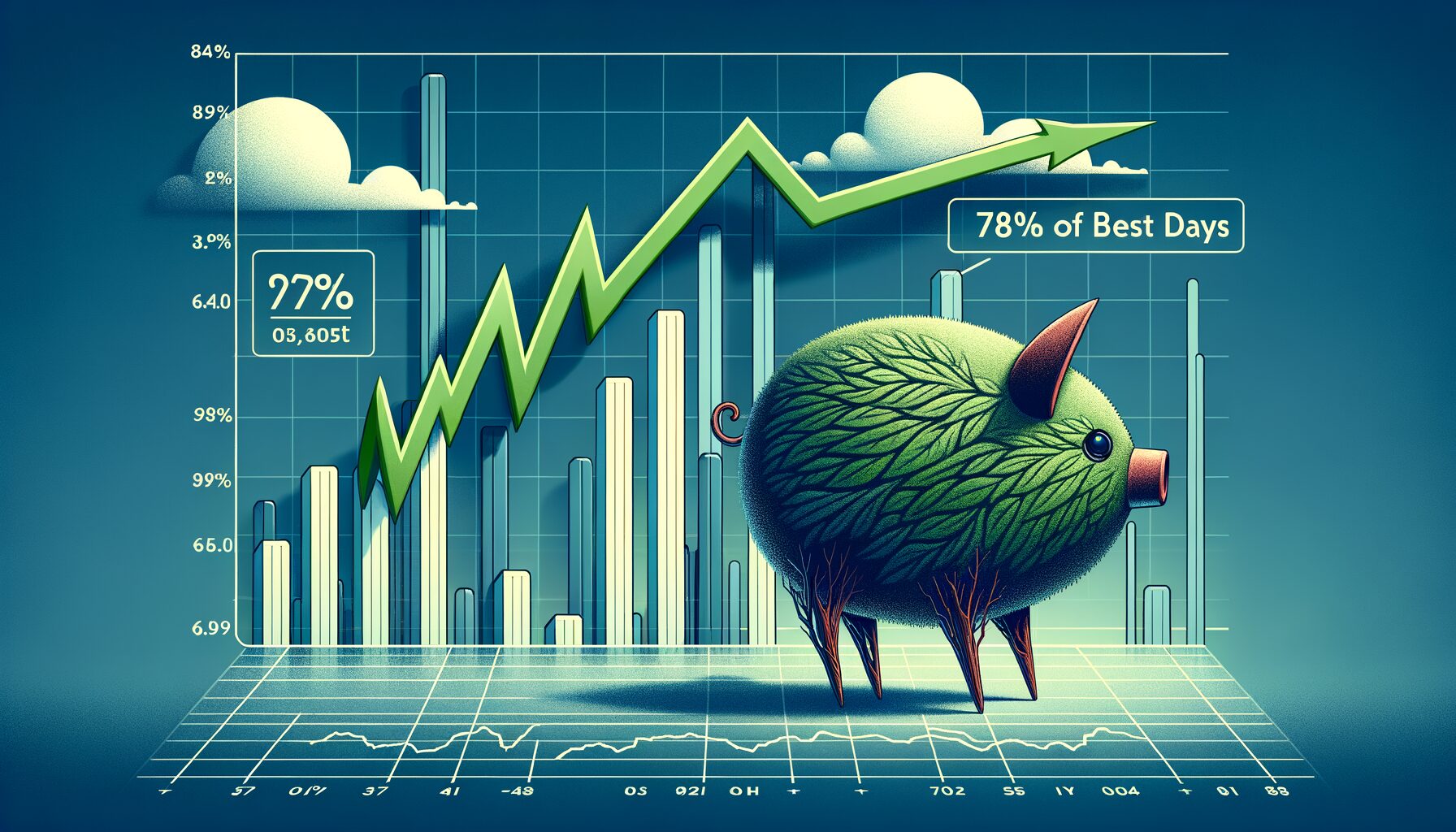78% of Market’s Best Days Happen During Bears: Don’t Touch Your 401(k)!

The bear market and its effect on your 401k is currently a major concern for many investors right now. With President Trump’s recent tariffs sending the markets into a tailspin, lots of people are wondering if they should move their 401k to cash during this stock market crash of 2025, or if there might actually be a silver lining to all of this market turbulence.
Also Read: Serbia Defies EU Over Russia Parade—De-Dollarization Signs Grow in Balkans
How Bear Markets Affect 401(k), Stocks, and Long-Term Wealth

Why Bears Shouldn’t Scare Your Retirement Plan
During these uncertain times, many financial advisors are actually recommending patience when it comes to your 401k investments in a bear market. And there’s a good reason for this advice.
Christine Benz, director of personal finance and retirement planning for Morningstar, stated:
“Resist the urge to shift out of stocks entirely. Such a move could buy you some short-term relief, but it will soon be replaced by another nagging worry: Is it time to get back in?”
The data strongly supports this approach too. According to Hartford Funds, about 78% of the market’s best days happen during bear markets or within the first two months of a bull market, and missing these crucial rebound days can really devastate your long-term returns.
Hartford Funds mentioned:
“If you missed the market’s 10 best days over the past 30 years, your returns would have been cut in half. And missing the best 30 days would have reduced your returns by an astonishing 83%.”
What Makes This Bear Different
A bear market officially begins when stocks drop 20% from their recent peaks. At the time of writing, the S&P 500 has already fallen about 18.9% since February, with approximately 12% of that drop occurring right after Trump’s tariff announcements were made public.
Mark Hamrick, senior economic analyst, said:
“While it is a tough pill to swallow, stock investors should buckle in for more volatility and the prospect of further declines beyond today.”
Also Read: JP Morgan Revises Apple Stock Price Prediction: See the New Target
So what should you do with your 401k during this bear market? Well, most experts suggest that staying invested while making some smart adjustments might be the best approach for most people.
Smart Moves Without Selling
Instead of immediately moving your 401k to cash, you might want to consider these alternative strategies during the stock market crash of 2025. First, international diversification could help by looking beyond just U.S. markets for additional stability in your portfolio. Another good option is Roth conversion, since lower account values right now could actually mean less tax impact when converting. And don’t forget about tax-loss harvesting, which lets you offset some gains with strategic selling of underperforming investments. These approaches can help maintain your long-term strategy without panicking and selling everything.
There is no way to go back and change your portfolio in the past. Keep in mind you can only plan how to manage it in the future and invested money should never be at risk of needing to be withdrawn in the short-term.
History Suggests Patience Pays
Many experts believe that the best time to invest in stocks is often during market downturns. And there’s also historical data showing that bear markets have occurred about 15 times since 1929, usually lasting around 18.9 months on average.
For example, the COVID-19 bear market of 2020 lasted just six months before we saw a full recovery. Similar patience may well be rewarded in this current bear market situation affecting 401k investments across the country.
Also Read: Currency: EUR/USD Stuck Between 1.1280 & 1.1400—Can the US Dollar Find Stability?
Control What You Can
During times of uncertainty like these, it’s probably best to focus on what’s manageable: your budgeting, building up emergency savings, and maintaining a proper perspective on the long-term nature of retirement investing.
Michael Cochran, CFP and chief investment officer of BentOak Capital, had this to say:
“Keep in mind that the market has likely already factored in expectations around trade policy. Instead of making major changes to your portfolio based on policy announcements or deadlines, it’s typically wiser to stay diversified and focused on your long-term financial goals, especially during periods of uncertainty.”
So, is my 401k safe in a recession? Based on historical trends, the answer is generally yes. If you can avoid panic selling and remember that bear markets do eventually come to an end, often followed by strong recoveries that reward patient investors.
Read More

3 Token Unlocks to Watch in the Final Week of August 2025
78% of Market’s Best Days Happen During Bears: Don’t Touch Your 401(k)!

The bear market and its effect on your 401k is currently a major concern for many investors right now. With President Trump’s recent tariffs sending the markets into a tailspin, lots of people are wondering if they should move their 401k to cash during this stock market crash of 2025, or if there might actually be a silver lining to all of this market turbulence.
Also Read: Serbia Defies EU Over Russia Parade—De-Dollarization Signs Grow in Balkans
How Bear Markets Affect 401(k), Stocks, and Long-Term Wealth

Why Bears Shouldn’t Scare Your Retirement Plan
During these uncertain times, many financial advisors are actually recommending patience when it comes to your 401k investments in a bear market. And there’s a good reason for this advice.
Christine Benz, director of personal finance and retirement planning for Morningstar, stated:
“Resist the urge to shift out of stocks entirely. Such a move could buy you some short-term relief, but it will soon be replaced by another nagging worry: Is it time to get back in?”
The data strongly supports this approach too. According to Hartford Funds, about 78% of the market’s best days happen during bear markets or within the first two months of a bull market, and missing these crucial rebound days can really devastate your long-term returns.
Hartford Funds mentioned:
“If you missed the market’s 10 best days over the past 30 years, your returns would have been cut in half. And missing the best 30 days would have reduced your returns by an astonishing 83%.”
What Makes This Bear Different
A bear market officially begins when stocks drop 20% from their recent peaks. At the time of writing, the S&P 500 has already fallen about 18.9% since February, with approximately 12% of that drop occurring right after Trump’s tariff announcements were made public.
Mark Hamrick, senior economic analyst, said:
“While it is a tough pill to swallow, stock investors should buckle in for more volatility and the prospect of further declines beyond today.”
Also Read: JP Morgan Revises Apple Stock Price Prediction: See the New Target
So what should you do with your 401k during this bear market? Well, most experts suggest that staying invested while making some smart adjustments might be the best approach for most people.
Smart Moves Without Selling
Instead of immediately moving your 401k to cash, you might want to consider these alternative strategies during the stock market crash of 2025. First, international diversification could help by looking beyond just U.S. markets for additional stability in your portfolio. Another good option is Roth conversion, since lower account values right now could actually mean less tax impact when converting. And don’t forget about tax-loss harvesting, which lets you offset some gains with strategic selling of underperforming investments. These approaches can help maintain your long-term strategy without panicking and selling everything.
There is no way to go back and change your portfolio in the past. Keep in mind you can only plan how to manage it in the future and invested money should never be at risk of needing to be withdrawn in the short-term.
History Suggests Patience Pays
Many experts believe that the best time to invest in stocks is often during market downturns. And there’s also historical data showing that bear markets have occurred about 15 times since 1929, usually lasting around 18.9 months on average.
For example, the COVID-19 bear market of 2020 lasted just six months before we saw a full recovery. Similar patience may well be rewarded in this current bear market situation affecting 401k investments across the country.
Also Read: Currency: EUR/USD Stuck Between 1.1280 & 1.1400—Can the US Dollar Find Stability?
Control What You Can
During times of uncertainty like these, it’s probably best to focus on what’s manageable: your budgeting, building up emergency savings, and maintaining a proper perspective on the long-term nature of retirement investing.
Michael Cochran, CFP and chief investment officer of BentOak Capital, had this to say:
“Keep in mind that the market has likely already factored in expectations around trade policy. Instead of making major changes to your portfolio based on policy announcements or deadlines, it’s typically wiser to stay diversified and focused on your long-term financial goals, especially during periods of uncertainty.”
So, is my 401k safe in a recession? Based on historical trends, the answer is generally yes. If you can avoid panic selling and remember that bear markets do eventually come to an end, often followed by strong recoveries that reward patient investors.
Read More

